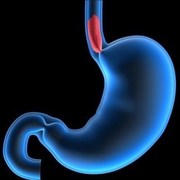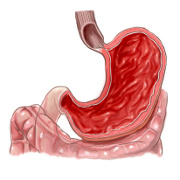Treatment
Once the cell changes of Barrett's esophagus occur, the changes are permanent. The goal of treatment is to prevent further damage by stopping the reflux of acid from the stomach. Treatment may include:
Medications
The following types of medications may be prescribed:
-
H
2
blockers, such as:
- Cimetidine
- Ranitidine
- Famotidine
- Nizatidine
-
Proton pump inhibitors, such as:
- Omeprazole
- Lansoprazole
- Pantoprazole
- Rabeprazole
Surgery
If the disease is severe or the medication is unsuccessful, your doctor may recommend surgery. Surgical options may include:
- Fundoplication —part of the upper stomach is wrapped around the esophagus; this is done to reduce further damage caused by GERD
- Esophagectomy—removal of the Barrett's segment of the esophagus
- Ablation of the abnormal lining by several methods—photodynamic therapy (PDT), argon plasma coagulation (APC), multipolar electrocoagulation (MPEC), heater probes, lasers, cryotherapy, and radiofrequency ablation (Most of these techniques are investigational, except for PDT.)
Monitoring
Your doctor may recommend endoscopy about (or at least) every 1-3 years to monitor the esophagus for early signs of cancer. This recommendation must be individualized for each person.
Please be aware that this information is provided to supplement the care provided by your physician. It is neither intended nor implied to be a substitute for professional medical advice. CALL YOUR HEALTHCARE PROVIDER IMMEDIATELY IF YOU THINK YOU MAY HAVE A MEDICAL EMERGENCY. Always seek the advice of your physician or other qualified health provider prior to starting any new treatment or with any questions you may have regarding a medical condition. Copyright © 2024 EBSCO Publishing All rights reserved.
 Aspirin Appears to Play A Role in Preventing Barrett's Esophagus
Aspirin Appears to Play A Role in Preventing Barrett's Esophagus






